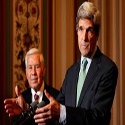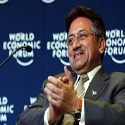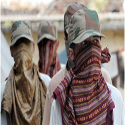Superintendent of Police stated in Islamabad that one person has been arrested after the two suicide bomb blasts in International Islamic University in Islamabad. These two suicide attacks were launched 10 seconds apart. The first one was in the university’s cafeteria while the other one was in the Shariah Department of the university.
Two bombs were defused in Peshawar near a girls high school.
One Person Has Been Arrested After The Bomb Blasts
Kerry-Lugar Bill For Financial Aid to Pakistan 2009-2013
The United State’s Senate approved legislation on Sept. 24 to triple non-military aid to Pakistan to about $1.5 billion a year for the next five years, 2009-2013.
However, some conditions are attached to this aid. This bill was authored by Senators John Kerry, Democrat of Massachusetts, and Richard Lugar, Republican of Indiana. Discussion on this bill will continue for some time in the press and media.
Instead of depending on the newspapers and politicians what they tell you you should read the document (the bill) by yourself and make your own decisions. The document is a little long but it would be worth reading to know the truth.
This is the text of the bill as it was approved by the Senate, although some bills may be changed further either by the House or through a conference committee. This is the latest version of the bill available on this website.
S 962 ES
111th CONGRESS
1st Session
S. 962
AN ACT
To authorize appropriations for fiscal years 2009 through 2013 to promote an enhanced strategic partnership with Pakistan and its people, and for other purposes.
Be it enacted by the Senate and House of Representatives of the United States of America in Congress assembled,
SECTION 1. SHORT TITLE.
This Act may be cited s the ‘Enhanced Partnership with Pakistan Act of 2009’.
SEC. 2. FINDINGS.
Congress makes the following findings:
(1) The people of Pakistan and the United States have a long history of friendship and comity, and the interests of both nations are well-served by strengthening and deepening this friendship.
(2) In February 2008, the people of Pakistan elected a civilian government, reversing years of political tension and mounting popular concern over governance and their own democratic reform and political development.
(3) A democratic, moderate, modernizing Pakistan would represent the wishes of the Pakistani people and serve as a model to other countries around the world.
(4) Economic growth is a fundamental foundation for human security and national stability in Pakistan, a country with over 175,000,000 people, an annual population growth rate of 2 percent, and a ranking of 136 out of 177 countries in the United Nations Human Development Index.
(5) Pakistan is a major non-NATO ally of the United States and has been a valuable partner in the battle against al Qaeda and the Taliban, but much more remains to be accomplished by both nations.
(6) The struggle against al Qaeda, the Taliban, and affiliated terrorist groups has led to the deaths of several thousand Pakistani civilians and members of the security forces of Pakistan over the past 7 years.
(7) Since the terrorist attacks of September 11, 2001, more al Qaeda terrorist suspects have been apprehended in Pakistan than in any other country, including Khalid Sheikh Muhammad, Ramzi bin al-Shibh, and Abu Faraj al-Libi.
(8) Despite the sacrifices and cooperation of the security forces of Pakistan, the top leadership of al Qaeda, as well as the leadership and rank-and-file of affiliated terrorist groups, are believed to be using Pakistan’s Federally Administered Tribal Areas (FATA) and parts of the North West Frontier Province (NWFP) and Balochistan as a haven and a base from which to organize terrorist actions in Pakistan and globally, including–
(A) attacks outside of Pakistan that have been attributed to groups with Pakistani connections, including–
(i) the suicide car bombing of the Indian embassy in Kabul, Afghanistan, which killed 58 people on June 7, 2008; and
(ii) The massacre of approximately 165 people in Mumbai, India, including 6 United States citizens, in late November 2008; and
(B) Attacks within Pakistan, including–
(i) An attack on the visiting Sri Lankan cricket team in Lahore on March 3, 2009;
(ii) An attack at the Marriott hotel in Islamabad on September 9, 2008;
(iii) The bombing of a political rally in Karachi on October 18, 2007;
(iv) The targeting and killing of dozens of tribal, provincial, and national holders of political office;
(v) An attack by gunfire on the U.S. Principal Officer in Peshawar in August 2008; and
(vi) The brazen assassination of former Prime Minister Benazir Bhutto on December 27, 2007.
(9) In the 12-month period ending on the date of the enactment of this Act, Pakistan’s security forces have struggled to contain a Taliban-backed insurgency that has spread from FATA into settled areas, including the Swat Valley and other parts of NWFP and Balochistan. This struggle has taken the lives of more than 1,500 police and military personnel and left more than 3,000 wounded.
(10) On March 27, 2009, President Obama noted, ‘Multiple intelligence estimates have warned that al Qaeda is actively planning attacks on the U.S. homeland from its safe-haven in Pakistan.’.
(11) According to a Government Accountability Office Report (GAO-08-622), ‘since 2003, the administration’s national security strategies and Congress have recognized that a comprehensive plan that includes all elements of national power–diplomatic, military, intelligence, development assistance, economic, and law enforcement support–was needed to address the terrorist threat emanating from the FATA’ and that such a strategy was also mandated by section 7102(b)(3) of the Intelligence Reform and Terrorism Prevention Act of 2004 (Public Law 108-458; 22 U.S.C. 2656f note) and section 2042(b)(2) of the Implementing the Recommendations of the 9/11 Commission Act of 2007 (Public Law 110-53; 22 U.S.C. 2375 note).
(12) In the past year, the people of Pakistan have been especially hard hit by rising food and commodity prices and severe energy shortages, wi
th two-thirds of the population living on less than $2 a day and one-fifth of the population living below the poverty line according to the United Nations Development Program.
(13) The people of Pakistan and the United States share many compatible goals, including–
(A) Combating terrorism and violent radicalism, both inside Pakistan and elsewhere;
(B) Solidifying democracy and the rule of law in Pakistan;
(C) Promoting the economic development of Pakistan, both through the building of infrastructure and the facilitation of increased trade.
(D) Promoting the social and material well-being of Pakistani citizens, particularly through development of such basic services as public education, access to potable water, and medical treatment.
(E) Safeguarding the peace and security of South Asia, including by facilitating peaceful relations between Pakistan and its neighbors.
(14) According to consistent opinion research, including that of the Pew Global Attitudes Survey (December 28, 2007) and the International Republican Institute (January 29, 2008), many people in Pakistan have historically viewed the relationship between the United States and Pakistan as a transactional one, characterized by a heavy emphasis on security issues with little attention to other matters of great interest to citizens of Pakistan.
(15) The election of a civilian government in Pakistan in February 2008 provides an opportunity, after nearly a decade of military-dominated rule, to place relations between Pakistan and the United States on a new and more stable foundation.
(16) Both the Government of Pakistan and the United States Government should seek to enhance the bilateral relationship through additional multi-faceted engagement in order to strengthen the foundation for a consistent and reliable long-term partnership between the two countries.
SEC. 3. DEFINITIONS.
In this Act:
(1) APPROPRIATE CONGRESSIONAL COMMITTEES- The term ‘appropriate congressional committees’ means the Committees on Appropriations and Foreign Relations of the Senate and the Committees on Appropriations and Foreign Affairs of the House of Representatives.
(2) COUNTERINSURGENCY- The term ‘counterinsurgency’ means efforts to defeat organized movements that seek to overthrow the duly constituted Governments of Pakistan and Afghanistan through violent means.
(3) COUNTERTERRORISM- The term ‘counterterrorism’ means efforts to combat al Qaeda and other foreign terrorist organizations that are designated by the Secretary of State in accordance with section 219 of the Immigration and Nationality Act (8 U.S.C. 1189), or other individuals and entities engaged in terrorist activity or support for such activity.
(4) FATA- The term ‘FATA’ means the Federally Administered Tribal Areas of Pakistan.
(5) NWFP- The term ‘NWFP’ means the North West Frontier Province of Pakistan, which has Peshawar as its provincial capital.
(6) PAKISTAN-AFGHANISTAN BORDER AREAS- The term ‘Pakistan-Afghanistan border areas’ includes the Pakistan regions known as NWFP, FATA, and parts of Balochistan in which the Taliban or Al Qaeda have traditionally found refuge.
(7) SECURITY-RELATED ASSISTANCE- The term ‘security-related assistance’.
(A) Grant assistance to carry out section 23 of the Arms Export Control Act (22 U.S.C. 2763);
(B) Assistance under chapter 2 of part II of the Foreign Assistance Act of 1961 (22 U.S.C. 2311 et seq.);
(C) Assistance under chapter 5 of part II of the Foreign Assistance Act of 1961 (22 U.S.C. 2347 et seq.);
(D) Any equipment, supplies, and training provided pursuant to section 1206 of the National Defense Authorization Act for Fiscal Year 2006 (Public Law 109-163; 119 Stat. 3456); and
(E) Any equipment, supplies, and training provided pursuant to section 1206 of the National Defense Authorization Act for Fiscal Year 2008 (Public Law 110-181; 122 Stat. 368).
(8) SECURITY FORCES OF PAKISTAN- The term ‘security forces of Pakistan’ means the military and intelligence services of the Government of Pakistan, including the Armed Forces, Inter-Services Intelligence Directorate, Intelligence Bureau, police forces, levies, Frontier Corps, and Frontier Constabulary.
(9) MAJOR DEFENSE EQUIPMENT- The term ‘major defense equipment’ has the meaning given in section 47(6) of the Arms Export Control Act (22 U.S.C. 2794(6)).
SEC. 4. STATEMENT OF POLICY.
It is the policy of the United States–
(1) To support the consolidation of democracy, good governance, and rule of law in Pakistan;
(2) To support economic growth and development in order to promote stability and security across Pakistan;
(3) To affirm and build a sustained, long-term, multifaceted relationship with Pakistan;
(4) To further the sustainable economic development of Pakistan and the improvement of the living conditions of its citizens, including in the Federally Administered Tribal Areas, by expanding United States bilateral engagement with the Government of Pakistan, especially in areas of direct interest and importance to the daily lives of the people of Pakistan;
(5) To work with Pakistan and the countries bordering Pakistan to facilitate peace in the region and harmonious relations between the countries of the region;
(6) To work with the Government of Pakistan to prevent any Pakistani territory from being used as a base or conduit for terrorist attacks in Pakistan, Afghanistan, India, or elsewhere in the world.
(7) To work in close cooperation with the Government of Pakistan to coordinate military, paramilitary, and police action against terrorist targets.
(8) To work with the Government of Pakistan to help bring peace, stability, and development to all regions of Pakistan, especially those in the Pakistan-Afghanistan border areas, including support for an effective counterinsurgency strategy;
(9) To expand people-to-people engagement between the United States and Pakistan, through increased educational, technical, and cultural exchanges and other methods;
(10) To encourage and promote public-private partnerships in Pakistan in order to bolster ongoing development efforts and strengthen economic prospects, especially with respect to opportunities to build civic responsibility and professional skills of the people of Pakistan; and
(11) To encourage the development of local analytical capacity to measure progress on an integrated basis across the areas of donor country expenditure in Pakistan, and better hold the Government of Pakistan accountable for how the funds are being spent.
SEC. 5. AUTHORIZATION OF FUNDS.
(a) Authorization- There are authorized to be appropriated to the President, for the purposes of providing assistance to Pakistan under the Foreign Assistance Act of 1961 (22 U.S.C. 2151 et seq.), the following amounts:
(1) For fiscal year 2009, up to $1,500,000,000.
(2) For fiscal year 2010, up to $1,500,000,000.
(3) For fiscal year 2011, up to $1,500,000,000.
(4) For fiscal year 2012, up to $1,500,000,000.
(5) For fiscal year 2013, up to $1,500,000,000.
(b) Availability of Funds-
(1) IN GENERAL- Of the funds appropriated in each fiscal year pursuant to the authorization of appropriations in subsection.
(A) None of the amounts appropriated may be made available after the date of the enactment of this Act for assistance to Pakistan unless the Pakistan Assistance Strategy Report has been submitted to the appropriate congressional committees in accordance with subsection (j)
(B) Not more than $750,000,000 may be made available for assistance to Pakistan in any fiscal year after 2009 unless the President’s Special Representative to Afghanistan and Pakistan submits to the appropriate congressional committees during that fiscal year–
(i) A certification that assistance provided to Pakistan under this Act to date has made or is making substantial progress toward achieving the principal objectives of United States assistance to Pakistan contained in the Pakistan Assistance Strategy Report pursuant to subsection (j)(1); and
(ii) A memorandum explaining the reasons justifying the certification described in clause (i).
(2) MAKER OF CERTIFICATION- In the event of a vacancy in, or the termination of, the position of the President’s Special Representative to Afghanistan and Pakistan, the certification described under paragraph (1)(B) may be made by the Secretary of State.
(c) Waiver- The Secretary of State may waive the limitations in subsection (b) if the Secretary determines, and certifies to the appropriate congressional committees, that it is in the national security interests of the United States to provide such waiver.
(d) Sense of Congress on Foreign Assistance Funds- It is the sense of Congress that, subject to an improving political and economic climate in Pakistan, there should be authorized to be appropriated up to $1,500,000,000 per year for fiscal years 2014 through 2018 for the purpose of providing assistance to Pakistan under the Foreign Assistance Act of 1961.
(e) Sense of Congress on Security-related Assistance- It is the sense of Congress that security-related assistance to the Government of Pakistan–
(1) Should be provided in close coordination with the Government of Pakistan, designed to improve the Government’s capabilities in areas of mutual concern, and maintained at a level that will bring significant gains in pursuing the policies set forth in paragraphs (6), (7), and (8) of section 4.
(2) Should be geared primarily toward bolstering the counter-insurgency capabilities of the Government to effectively defeat the Taliban-backed insurgency and deny popular support to al Qaeda and other foreign terrorist organizations that are based in Pakistan.
(f) Use of Funds-
(1) IN GENERAL- Funds appropriated pursuant to subsection (a) shall be used for projects intended to benefit the people of Pakistan, including projects that promote–
(A) Just and democratic governance, including–
(i) Police reform, equipping, and training;
(ii) Independent, efficient, and effective judicial systems;
(iii) Political pluralism, equality, and the rule of law;
(iv) Respect for human and civil rights and the promotion of an independent media;
(v) Transparency and accountability of all branches of government and judicial proceedings;
(vi) Anti-corruption efforts among bureaucrats, elected officials, and public servants at all levels of military and civilian government administration;
(vii) Countering the narcotics trade; and
(viii) The implementation of legal and political reforms in the FATA.
(B) Economic freedom, including–
(i) Sustainable economic growth, including in rural areas, and the sustainable management of natural resources;
(ii) Investments in energy and water, including energy generation and cross-border infrastructure projects with Afghanistan;
(iii) Employment generation, including essential basic infrastructure projects such as roads and irrigation projects and other physical infrastructure.
(iv) Worker rights, including the right to form labor unions and legally enforce provisions safeguarding the rights of workers and local community stakeholders.
(C) Investments in people, particularly women and children, including:
(i) broad-based public primary and secondary education and vocational training for both boys and girls;
(ii) food security and agricultural development to ensure food staples and other crops that provide economic growth and income opportunities in times of severe shortage;
(iii) quality public health, including medical clinics with well trained staff serving rural and urban communities;
(iv) vocational training for women and access to microfinance for small business establishment and income generation for women; and
(v) higher education to ensure a breadth and consistency of Pakistani graduates to prepare citizens to help strengthen the foundation for improved governance and economic vitality, including through public-private partnerships; and
(D) long-term development in regions of Pakistan where internal conflict has caused large-scale displacement.
(2) FUNDING FOR POLICE REFORM, EQUIPPING, AND TRAINING- Up to $100,000,000 of the funds appropriated pursuant to subsection (a) should be used for police reform, equipping, and training.
(g) Preference for Building Local Capacity- The President is encouraged, as appropriate, to utilize Pakistani firms and community and local nongovernmental organizations in Pakistan, including through host country contacts, and to work with local leaders to provide assistance under this section.
(h) Authority To Use Funds for Operational and Audit Expenses-
(1) IN GENERAL- Of the amounts appropriated for a fiscal year pursuant to subsection (a)–
(A) Up to $10,000,000 may be used for administrative expenses of Federal departments and agencies in connection with the provision of assistance authorized by this section;
(B) Up to $30,000,000 may be made available to the Inspectors General of the Department of State, the United States Agency for International Development, and other relevant Executive branch agencies in order to provide audits and program reviews of projects funded pursuant to this section; and
(C) Up to $5,000,000 may be used by the Secretary to establish a Chief of Mission Fund for use by the Chief of Mission in Pakistan to provide assistance to Pakistan under the Foreign Assistance Act of 1961 (22 U.S.C. 2151 et seq.) to address urgent needs or opportunities, consistent with the purposes outlined in subsection (f) or for purposes of humanitarian relief.
(2) AUTHORITY IN ADDITION TO EXISTING AMOUNTS- The amounts authorized under subparagraphs (A) and (B) of paragraph (1) to be used for the purposes described in such subparagraphs are in addition to other amounts that are available for such purposes.
(i) Use of Funds- Amounts appropriated or otherwise made available to carry out this section shall be utilized to the maximum extent possible as direct expenditures for projects and programs, subject to existing reporting and notification requirements.
(j) Pakistan Assistance Strategy Report- Not later than 45 days after the date of enactment of this Act, or September 15, 2009, whichever date comes later, the Secretary of State shall submit to the appropriate congressional committees a report describing United States policy and strategy with respect to assistance to Pakistan. The report shall include–
(1) A description of the principal objectives of United States assistance to Pakistan to be provided under this Act;
(2) The amounts of funds authorized to be appropriated under subsection (a) proposed to be allocated to programs or projects designed to achieve each of the purposes of assistance listed in subsection (f).
(3) A description of the specific projects and programs for which amounts authorized to be appropriated pursuant to subsection (a) are proposed to be allocated;
(4) a list of criteria and benchmarks to be used to measure the effectiveness of projects described under subsection (f), including a systematic, qualitative, and where possible, quantitative basis for assessing whether desired outcomes are achieved and a timeline for completion of each project and program.
(5) A description of the role to be played by Pakistani national, regional, and local officials and members of Pakistani civil society and local private sector, civic, religious, and tribal leaders in helping to identify and implement programs and projects for which assistance is to be provided under this Act, and of consultations with such representatives in developing the strategy.
(6) A description of all amounts made available for assistance to Pakistan during fiscal year 2009 prior to submission of the report, including a description of each project or program for which funds were made available and the amounts allocated to each such program or project.
(7) A description of the steps taken, or to be taken, to ensure assistance provided under this Act is not awarded to individuals or entities affiliated with terrorist organizations; and
(8) A projection of the levels of assistance to be provided to Pakistan under this Act, broken down into the following categories as described in the annual ‘Report on the Criteria and Methodology for Determining the Eligibility of Candidate Countries for Millennium Challenge Account Assistance’:
(A) Civil liberties.
(B) Political rights.
(C) Voice and accountability.
(D) Government effectiveness.
(E) Rule of law.
(F) Control of corruption.
(G) Immunization rates.
(H) Public expenditure on health.
(I) Girls’ primary education completion rate.
(J) Public expenditure on primary education.
(K) Natural resource management.
(L) Business start-up.
(M) Land rights and access.
(N) Trade policy.
(O) Regulatory quality.
(P) Inflation control.
(Q) Fiscal policy.
(k) Notification Requirements-
(1) NOTICE OF ASSISTANCE FOR BUDGET SUPPORT- The President shall notify the appropriate congressional committees not later than 15 days before obligating any assistance under this section as budgetary support to the Government of Pakistan or any element of such Government and shall describe the purpose and conditions attached to any such budgetary support.
(2) SEMIANNUAL REPORT- Not later than 90 days after the submission of the Pakistan Assistance Strategy Report pursuant to subsection (j), and every 180 days thereafter, the Secretary of State shall submit a report to the appropriate congressional committees that describes the assistance provided under this section. The report shall include–
(A) A description of all assistance provided pursuant to this Act since the submission of the last report, including each program or project for which assistance was provided and the amount of assistance provided for each program or project;
(B) A description of all assistance provided pursuant to this Act, including–
(i) The total amount of assistance provided for each of the purposes described in subsection (f).
(ii) The total amount of assistance allocated to programs or projects in each region in Pakistan.
(C) A list of persons or entities from the United States or other countries that have received funds in excess of $100,000 to conduct projects under this section during the period covered by the report, which may be included in a classified annex, if necessary to avoid a security risk, and a justification for the classification.
(D) An assessment of the effectiveness of assistance provided pursuant to this Act during the period covered by the report in achieving desired objectives and outcomes, measured on the basis of the criteria contained in the Pakistan Assistant Strategy Report pursuant to subsection (j)(4).
(i) A description of– The programs and projects for which amounts appropriated pursuant to subsection (a) are proposed to be allocated during the 180-day period after the submission of the report:
(ii) the relationship of such programs and projects to the purposes of assistance described in subsection (f); and
(iii) the amounts proposed to be allocated to each such program or project;
(E) A description of any shortfall in United States financial, physical, technical, or human resources that hinder the effective use and monitoring of such funds;
(F) A description of any negative impact, including the absorptive capacity of the region for which the resources are intended, of United States bilateral or multilateral assistance and recommendations for modification of funding, if any;
(G) any incidents or reports of waste, fraud, and abuse of expenditures under this section;
(H) the amount of funds appropriated pursuant to subsection (a) that were used during the reporting period for administrative expenses or for audits and program reviews pursuant to the authority under subsection (h).
(I) a description of the expenditures made from any Chief of Mission Fund established pursuant to subsection (h)(3) during the period covered by the report, the purposes for which such expenditures were made, and a list of the recipients of any expenditures from the Chief of Mission Fund in excess of $10,000; and
(J) an accounting of assistance provided to Pakistan under this Act, broken down into the categories set forth in subsection (j)(8).
(K) Government Accountability Office Report- Not later than one year after the submission of the Pakistan Assistance Strategy Report under subsection (j), and annually thereafter, the Comptroller General of the United States shall submit to the appropriate congressional committees a report that contains–
(L) a review of, and comments addressing, the Pakistan Assistance Strategy Report; and
(1) recommendations relating to any additional actions the Comptroller General believes could help improve the efficiency and effectiveness of United States efforts to meet the objectives of this Act.
(M) Sense of Congress on Funding of Priorities- It is the sense of Congress that, as a general principle, the Government of Pakistan should allocate a greater portion of its budget to the recurrent costs associated with education, health, and other priorities described in this section.
(N) Consultation Requirement- The President shall consult the appropriate congressional committees on the strategy in subsection (j), including criteria and benchmarks developed under paragraph (4) of such subsection, not later than 15 days before obligating any assistance under this section.
SEC. 6. LIMITATION ON CERTAIN ASSISTANCE.
(a) Limitation on Certain Military Assistance- Beginning in fiscal year 2010, no grant assistance to carry out section 23 of the Arms Export Control Act (22 U.S.C. 2763) and no assistance under chapter 2 of part II of the Foreign Assistance Act of 1961 (22 U.S.C. 2311 et seq.) may be provided to Pakistan in a fiscal year until the Secretary of State makes the certification required under subsection (c).
(b) Limitation on Arms Transfers- Beginning in fiscal year 2012, no letter of offer to sell major defense equipment to Pakistan may be issued pursuant to the Arms Export Control Act (22 U.S.C. 2751 et seq.) and no license to export major defense equipment to Pakistan may be issued pursuant to such Act in a fiscal year until th
e Secretary of State makes the certification required under subsection (c).
(c) Certification- The certification required by this subsection is a certification to the appropriate congressional committees by the Secretary of State, after consultation with the Secretary of Defense and the Director of National Intelligence, that the security forces of Pakistan–
(1) Are making concerted efforts to prevent al Qaeda and associated terrorist groups, including Lashkar-e-Taiba and Jaish-e-Mohammed, from operating in the territory of Pakistan;
(2) Are making concerted efforts to prevent the Taliban and associated militant groups from using the territory of Pakistan as a sanctuary from which to launch attacks within Afghanistan; and
(3) Are not materially interfering in the political or judicial processes of Pakistan.
(d) Waiver- The Secretary of State may waive the limitations in subsections (a) and (b) if the Secretary determines it is important to the national security interests of the United States to provide such waiver.
(e) Prior Notice of Waiver- A waiver pursuant to subsection (d) may not be exercised until 15 days after the Secretary of State provides to the appropriate congressional committees written notice of the intent to issue such waiver and the reasons therefor. The notice may be submitted in classified or unclassified form, as necessary.
(f) Annual Report- The Secretary of State, after consultation with the Secretary of Defense and the Director of National Intelligence, shall submit to the appropriate congressional committees an annual report on the progress of the security forces of Pakistan in satisfying the requirements enumerated in subsection (c). The Secretary of State shall establish detailed, specific requirements and metrics for evaluating the progress in satisfying these requirements and apply these requirements and metrics consistently in each annual report. This report may be submitted in classified or unclassified form, as necessary.
SEC. 7. SENSE OF CONGRESS ON COALITION SUPPORT FUNDS.
It is the sense of Congress that–
(1) Coalition Support Funds are critical components of the global fight against terrorism, and in Pakistan provide essential support for–
(A) military operations of the Government of Pakistan to destroy the terrorist threat and close the terrorist safe haven, known or suspected, in the FATA, the NWFP, and other regions of Pakistan.
(B) military operations of the Government of Pakistan to protect United States and allied logistic operations in support of Operation Enduring Freedom in Afghanistan;
(2) despite the broad discretion Congress granted the Secretary of Defense in terms of managing Coalition Support Funds, the Pakistan reimbursement claims process for Coalition Support Funds requires increased oversight and accountability, consistent with the conclusions of the June 2008 report of the United States Government Accountability Office (GAO-08-806);
(3) in order to ensure that this significant United States effort in support of countering terrorism in Pakistan effectively ensures the intended use of Coalition Support Funds, and to avoid redundancy in other security assistance programs, such as Foreign Military Financing and Foreign Military Sales, more specific guidance should be generated, and accountability delineated, for officials associated with oversight of this program within the United States Embassy in Pakistan, the United States Central Command, the Department of Defense, the Department of State, and the Office of Management and Budget; and
(4) the Secretary of Defense should submit to the appropriate congressional committees and the Committees on Armed Services of the Senate and the House of Representatives a semiannual report on the use of Coalition Support Funds, which may be submitted in classified or unclassified form as necessary.
SEC. 8. PAKISTAN-AFGHANISTAN BORDER AREAS STRATEGY.
(a) Development of Comprehensive Strategy- The Secretary of State, in consultation with the Secretary of Defense, the Director of National Intelligence, and such other government officials as may be appropriate, shall develop a comprehensive, cross-border strategy that includes all elements of national power–diplomatic, military, intelligence, development assistance, humanitarian, law enforcement support, and strategic communications and information technology–for working with the Government of Pakistan, the Government of Afghanistan, NATO, and other like-minded allies to best implement effective counterterrorism and counterinsurgency measurers in and near the Pakistan-Afghanistan border areas.
(b) Report- Not later than 90 days after the date of the enactment of this Act, the Secretary of State shall submit to the appropriate congressional committees a detailed description of a comprehensive strategy for counterterrorism and counterinsurgency in the Pakistan-Afghanistan border areas containing the elements specified in subsection (a) and proposed timelines and budgets for implementing the strategy.
SEC. 9. SENSE OF CONGRESS.
It is the sense of Congress that the United States should–
(1) recognize the bold political steps the Pakistan electorate has taken during a time of heightened sensitivity and tension in 2007 and 2008 to elect a new civilian government, as well as the continued quest for good governance and the rule of law under the elected government in 2008 and 2009;
(2) seize this strategic opportunity in the interests of Pakistan as well as in the national security interests of the United States to expand its engagement with the Government and people of Pakistan in areas of particular interest and importance to the people of Pakistan;
(3) continue to build a responsible and reciprocal security relationship taking into account the national security interests of the United States as well as regional and national dynamics in Pakistan to further strengthen and enable the position of Pakistan as a major non-NATO ally;
(4) seek ways to strengthen our countries’ mutual understanding and promote greater insight and knowledge of each other’s social, cultural and historical diversity through personnel exchanges and support for the establishment of institutions of higher learning with international accreditation.
(5) explore means to consult
with and utilize the relevant expertise and skills of the Pakistani-American community.
SEC. 10. TERM OF YEARS.
With the exception of subsections (b)(1)(B), (j), (k), and (l) of section 5, this Act shall remain in force after September 30, 2013.
Passed the Senate June 24, 2009.
Attest:
Secretary.
111th CONGRESS
1st Session
S. 962
AN ACT
To authorize appropriations for fiscal years 2009 through 2013 to promote an enhanced strategic partnership with Pakistan and its people, and for other purposes.
Pervaiz Musharraf is Coming Back to Form His Own Political Party
This is the news or rumour what ever you call it.
Pakistani President Asif Ali Zardari disclosed last week that Pervaiz Musharraf resigned from presidentship as part of a deal. That has created a storm in Pakistani politcal arena. What Zardari has disclosed if it is true then one thing is sure that Saudi Arabia and America are among the guarantors of this deal.
Now a days Nawaz Sharif is in Saudi Arabia and he has met King Abdullah of Saudi Arabia. Earlier Pervaiz Musharraf met the King a couple of weeks ago. It is hard to believe that Nawaz Sharif and other politicians of Pakistan were not aware of this deal. Nawaz Sharif must have known about this deal since he is quite close to the King. But I believe he was trying to earn extra mileage by making noise against Pervaiz Musharraf that he must be tried on treason charges.
I think Pervaiz Musharraf will not be tried for anything. America will also not favour this thing. Reason, Richard Holbrook wants Pakistanis to concentrate on the agenda or in fact To-Do-List provided by the US. And pakistanis don’t have any other option.
A couple of commnetators, essentially supporters of Nawaz Sharif indicated in the TV interviews that Supreme Court Chief Justice Iftikhar Chaudary may take action against Pervaiz Musharraf by himself.
He may do so just to show to the public that he is a free decision maker. Other possibility is that Nawaz Sharif party may file a case against Pervaiz Musharraf in the Supreme Court and Mr. Chaudary will accept the case but nothing will happen. Nawaz Sharif will not do anything against the desires of Saudi Arabia and the US. That is for sure. He needs support from both of them if and when he has to form a government.
It seems US don’t trust Nawaz Sharif. But also wants to keep him in the loop because Nawaz League will be next in line if PPP fails to control political and civil turmoil in Pakistan. The US also don’t trust Asif Ali Zardari and Yousaf Raza Gilani anyway.
So Pervaiz Musharraf may be third option in Pakistan’s politics. The US trust him he has some respect and credibility definitely more than Nawaz Sharif and Zardari in the eyes of Pakistanis. He can get things done. His past is clean from corruption charges while both Nawaz Sharif and Asif Zardari are benefactors of NRO. Both have tainted past. Asif Ali Zardari has been quoted in the foreign press as Mr.10 percent. This is not something new.
News also say that Pervaiz Musharraf has contacted MQM and PML(Q). The ideal situation Pervaiz Musharraf may be looking for is to get a top position either in MQM or PML (Q). In the absence of this option he may form his own political party but MQM and PML (Q) may support him in the next election. The PMLQ members who are not happy with Chaudary Shujat’s leadership they may join Pervaiz Musharraf.
Over all this would be a positive change for the country if it happens.
Suicide Trainee Bombers Captured Along With Weapons in Swat Valley
Pakistan security forces have captured 14 vehicles with 35,000 kilograms of explosive material along with other military hardware in Swat Valley today July 27, 2009.
Operational commander has also claimed arrest of nine people and several children trained for suicide bombing attacks. This news is reported by Dawn.
I think the important information which is missing from this news item is, what was make and origin of those vehicles, military hardware and explosives. Who were the people, what was their nationality. Capturing of this stuff and people is half the story. The concerned authorities should update the nation with full information. In fact they should show all the stuff on TV briefings. It is very important for the army and government to do that to achieve the support of the people. Otherwise when the government blame India involved in these activities quite a number of people in Pakistan as well as in the world don’t believe them and consider that as propaganda.
India Blamed Pakistan Protecting Militants’ Satellite Phones
Today Indian Express has published a statement of Indian government that they have found evidence that Pakistan has set up an electronic infrastructer to protect Thuraya satellite phones used by Pakistani militants targeting India. According to Indian sources transmitters have been found along the Line of Control and Pakistan-Indian border which obscure the signals originating from the phones. Indian believe it could not exist without the implicit support of Pakistani government.
This allegation has come just a week before the the meeting of Foreign Secretaries of India and Pakistan to discuss steps Islamabad has taken to curb the terrorism directed against India.
Is Pakistan involved in this activity as India has blamed? May be? The problem is Pakistan has no credibility in front of world community. In November last year on the occasion of Mumbai terrorist attacks Indian blamed Pakistan and said they have evidence of mobile phone communication. President Zardari and Rahman Malik of Interior Ministry of Pakistan immediately denied the charges which turned out to be true later. So Pakistan should be careful.
If the Pakistani government is involved in this particular case the reason could be to shield it unsuccessful efforts to control militant activities. Why they cannot locate the people who are involved in these type of activities. May be Pakistan should seek help from India.
Unless there is a political will in Pakistan to curb the extremism, nothing is going to change. Recent events indicate government is afraid of religious parties and mullahs. PPP government is also afraid of Nawaz Sharif because he supports these mullahs and he has shown power to move the people with the help of TV media against PPP government.
Most Expensive Electricity in The World
Today news have appeared in the local newspapers that with the recent purposed increase of Rs. 2.50 per unit will make electricity most expensive the world.
This is another deed of people’s government. Has anybody raised any voice against this increase? I have seen protest statements only from Karachi merchants and Jam Madad Ali, leader of the opposition in Sindh assembly. People of Karachi expect MQM to take strong stand on this issue.
If you go to low income areas of Karachi you would see a web of wires in the streets above your head. All these wires are running illegally from the distribution poles to people’s homes. In local language it is called kunda system. The question is, why the government cannot stop the stealing of electricity from the grid system? The burden of this free for all stealing goes to other people who do not steal.
Dunya TV has run a poll on their website about the budget 2009-10. As of today 86 per cent indicated that this is anti people budget.
Do you have any opinion on the budget or anything related to people’s welfare Pakistan Forum is open for anybody and everybody. You can say what ever is on your mind. You are welcome to write your comments.
Lashkar-e-Tayaba Involved in Mumbai Attacks – Pakistani Security Sources
Wall Street Journal reported today quoting Pakistani security officials that Laskar-e-Tayaba has confessed they were involved in Mumbai attacks.
Last month Pakistani security police arrested Mr. Zarrar Shah a top Lashkar commander in Pakistani controlled Kashmir. According to Pakistani sources Mr. Shah confessed the group had a role in these attacks. He admitted he was one of the key planners of the operation and talked to attackers during the rampage giving them advice to keep them focused. This phone call was intercepted by US intelligence. When this phone recording may have been played there was no room for Pakistan and Mr. Shah to refute the allegation that Pakistani territory was used in this attack.
This disclosure now will put international pressure on Pakistan to accept that attacks were originated from its territory.
During all this time Pakistan has been insisting India should provide evidence about Pakistan’s involvement. US, Britain and India have always been saying Lashkar-e-Tayaba is involved. That means India and US have better intelleginece about Pakistan than the government of Pakistan or Mr. Zardari thinks the international community will believe him.
How much coordination Pakistan’s different agencies have among themselves here is something you would like to read.
Farhat Ullah Babar a spokeman for Asif Ali Zardari said on Tuesday he is not aware of investigation proving any link between Lashkar and Mumbai attacks. He further said “The Interior Ministry has not been furnished any evidence about this investigation”.
Now the million dollar question is, will Pakistan do anything against these Islamic extremeists. If history is any indication then expect nothing. But the difference this time is that US, British, India and Pakistan’s traditional allies will put pressure on Pakistan to take action.











